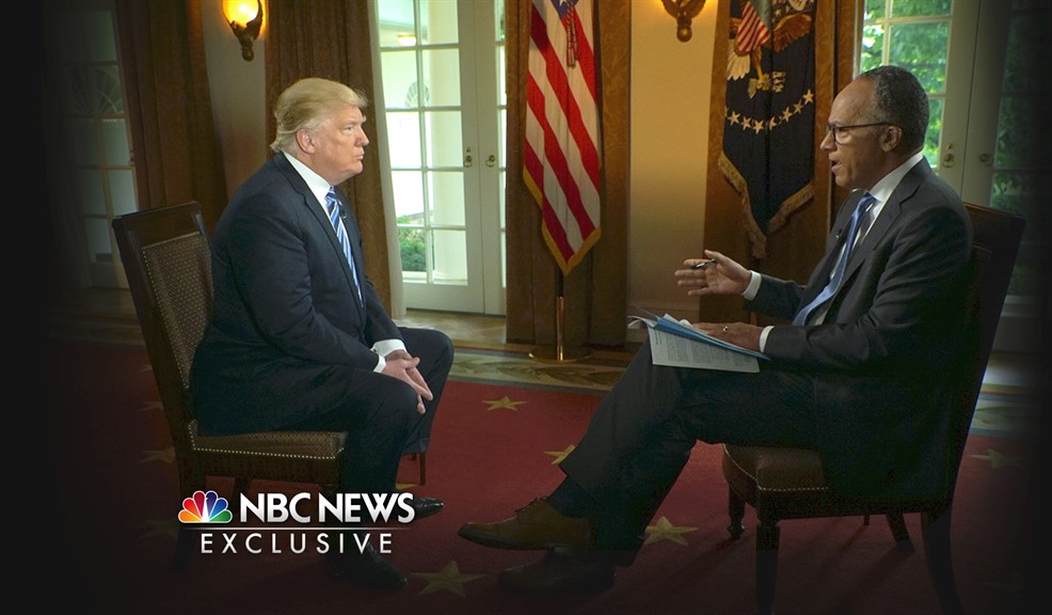Sooner or later, the truth always comes out in politics, at least as long as there remain even a few independent and intellectually honest journalists willing to put their careers and reputations on the line for the record.
Former New York Times and Pro Publica investigative reporter Jeff Gerth is one such journalist, and his recent four-part series — The Press Versus the President — in the Columbia Journalism Review provides an in-depth, air-tight indictment of media malpractice that dishonors genuine journalists and journalism, from 2016 to the present.
It’s almost impossible to summarize in a few sentences the magnitude of the failure of American journalism in covering former President Donald Trump and the multiple allegations that became known as “Russiagate.” But these two graphs from part one of Gerth’s masterpiece of reporting provide a solid first step in that direction:
“Before the 2016 election, most Americans trusted the traditional media and the trend was positive, according to the Edelman Trust Barometer. The phrase ‘fake news’ was limited to a few reporters and a newly organized social media watchdog. The idea that the media were ‘enemies of the American people’ was voiced only once, just before the election on an obscure podcast, and not by Trump, according to a Nexis search.
“Today, the US media has the lowest credibility—26 percent—among forty-six nations, according to a 2022 study by the Reuters Institute for the Study of Journalism. In 2021, 83 percent of Americans saw ‘fake news’ as a ‘problem,’ and 56 percent—mostly Republicans and independents—agreed that the media were ‘truly the enemy of the American people,’ according to Rasmussen Reports.”
That last data point showing more than half of the country view the media as “the enemy of the American people” ought to put the fear of God into every man and woman working at every news website, cable news outlet, newspaper, broadcast media and news analysis and opinion website.
If American journalism doesn’t get its act together and soon, there will be “media outlets” in the future but they won’t be anything recognizable to the Founders who wrote the First Amendment’s guarantee of an independent media as a check on government, or to any of us who have labored for decades in newsrooms, practicing a profession that depends upon verification and documentation for its reputation and indeed its very existence.
At another level, it’s actually quite easy to capture the essence of the present crisis in American journalism. Beginning during the first weeks of the Trump presidency and led by the New York Times, Washington Post, and the Wall Street Journal, thousands upon thousands of articles were published and broadcast during the next four years that uncritically assumed the infamous Steele Dossier to be accurate.
Multiple congressional investigations took place, the Department of Justice Inspector General conducted a landmark investigation of the FBI, and a Special Counsel, former FBI Director Robert Mueller, was appointed to, finally, determine the accuracy of the dossier’s central claim, that Russian intelligence actively and decisively aided the Trump 2016 campaign.
Gerth describes the scope and impact of the Mueller probe, which cost more than 30 million tax dollars:
“The inquiry had issued more than 2,800 subpoenas, interviewed 500 witnesses, and generated enormous interest. There were 533,000 news articles published involving Russia and Trump or Mueller, between Mueller’s appointment and the release of his report, according to a study by NewsWhip, a media analytics company. The articles led to 245 million interactions on social media, the study, funded by the media site Axios, also found.”
All of that, and Mueller’s conclusion was “the investigation did not establish that the [Trump] Campaign coordinated or conspired with the Russian government.”
Few in the mainstream media concretely acknowledged that Mueller’s conclusion undermined the foundation of their multiple years of sensational, devastating, but ultimately incorrect reporting. To this day, none of the Pulitzers, Polk, and other prestigious awards given to recognize that fundamentally flawed reporting have been returned.
Related: Trump Threatens Pulitzer Prize Board with Defamation Suit
It should be noted that in part four of his analysis, Gerth points to the final report of the Senate Select Committee on Intelligence in August 2020 as describing an August 2016 meeting between then-Trump campaign manager Paul Manafort and a shadowy Ukrainian business associate, Konstantin Kilmnik, with the latter frequently portrayed as a Russian intelligence asset.
The Senate report, Gerth tells us, described that meeting as the “’single most important direct tie between senior Trump Campaign officials and the Russian intelligence services’ and labeled it ‘a grave counterintelligence threat’ to the United States. Some of the Democratic members of the panel, in an addendum, wrote that Manafort’s sharing of campaign data ‘is what collusion looks like.’”
But Gerth makes clear that even on that alleged single most important direct tie, the evidence is anything but clear:
“As for Kilimnik possibly being a Russian spy, the only known official inquiry, by Ukraine in 2016, didn’t result in charges. More recent claims that he worked for the Russians, by the Senate intelligence panel in 2020 and the Treasury Department in 2021, offered no evidence.
“Conversely, there are FBI and State Department documents showing Kilmnik was a ‘sensitive source’ for the latter. (The documents were disclosed a few years ago by John Solomon, founder of the Just the News website. Kilmnik, in an email to me, confirmed his ties with State.).”
In other words, the guy alleged to prove most decisively that there were direct ties between the Trump campaign and Russian intelligence was actually working for the U.S. State Department!
Even the Dean of American “Gotcha” investigative journalism, Watergate Bob Woodward, described the dossier as a “garbage document.”
Today’s journalists better soon discover the truth of what my former Washington Times editor, Wes Pruden, taught me: “Get it first, but first get it right.”










Join the conversation as a VIP Member